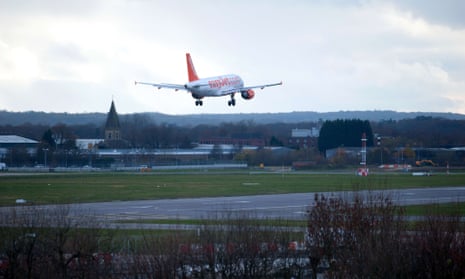Investors remain cautious given the worries about the global economy, Greece and the tensions in the Middle East.
But with oil prices dropped back after Thursday’s surge - which was fuelled by Saudi Arabia taking military action in Yemen - and a couple of positive broker notes, airlines are recovering from recent losses.
A day after its latest update raised concerns about negative currency effects in the remainder of the year, easyJet has climbed 43p to £18.80, the biggest riser in the leading index. Analysts at RBC raised their rating on the budget airline from sector perform to outperform and their price target from £18 to £20, saying:
We see a rising prospect that easyJet can report stable (not falling) pre-foreign exchange revenue per seat for summer 2015 and thus lift our diluted earnings per share forecast to 140p. Within Europe, we see the prospect of a balanced supply/demand outlook enabling fuel gains to be retained (we do not see this for long haul) and thus lift our rating.
Meanwhile British Airways owner International Airlines Group is up 8p at 595p, as Liberum issued a buy note, making it a top pick after its recent results:
2015 operating profit [is] guided higher as BA and Iberia progress well. We see re-rating potential as financial metrics converge with low-cost carriers.
Overall though the FTSE 100 has slipped another 12.22 points to 6883.11, a week after it breached the 7000 barrier for the first time. Added to the geo-political uncertainties - the Middle East, Greece’s attempts to agree a deal with the rest of the eurozone before it runs out of money - are uncertainties about the US economy and, crucially, when the Federal Reserve will raise interest rates.
A fourth quarter US GDP reading later should give more clues, as should a speech by Fed chair Janet Yellen.
Among the fallers, Randgold Resources is down 140p to £47.20 and Fresnillo has fallen 11p to 699.5p as gold and silver fell back after gains on Thursday when investors sought havens amid a plunge in stock markets.
Other miners were also weaker after new figures from China showed industrial profits falling 4.3% year on year in January and February.
Anglo American is down 26.5p at £10.50 while Rio Tinto has lost 46p to £28.31.
But Vodafone has bucked the downward trend, adding 3.1p to 227.10p after it spend a little over $4bn in an Indian government auction of airwave spectum, compared to estimates of more than $5bn. JP Morgan Cazenove said:
After 19 days, and 115 rounds of bidding, the Indian spectrum auction has concluded. Interestingly the results seem much more favourable than feared. Notably: (1) The big three operators, Bharti, Vodafone and Idea, have retained almost all their valuable 900MHz spectrum, (2) Vodafone has secured a sizeable 30MHz of additional 2.1GHz spectrum, (3) Vodafone has increased its 3G coverage from 9 to 16 circles, which represents 88% of its service revenue footprint, (4) Despite these incremental “wins”, Vodafone’s total spend at $4.2bn is only in-line with our expectation, and lower than the $5.5bn Bloomberg feared.
With the auction overhang removed, and foreign exchange pressures easing, we believe it is time to focus back onto the re-rating potential offered by Vodafone’s improving European outlook, and our anticipated return to revenue growth.
UBS analyst Polo Tang was also positive:
We think the auction outcome could lead to Indian operators increasing pricing in order to reduce balance sheet pressures and this would be a positive outcome for Vodafone. We believe Vodafone could look to IPO its Indian business from the end of 2016 onwards and India represents around 10% of Vodafone EBITDA.
With the overhang from Indian spectrum auctions now cleared and the euro recovering (around 50% of EBITDA is euro denominated), we think investor focus for Vodafone can switch back to improving organic service revenue growth trends. We see a dividend yield of 5% as attractive and see upside to estimates from market repair/mobile data and do not believe Vodafone will undertake any transformational M&A near-term.

Comments (…)
Sign in or create your Guardian account to join the discussion